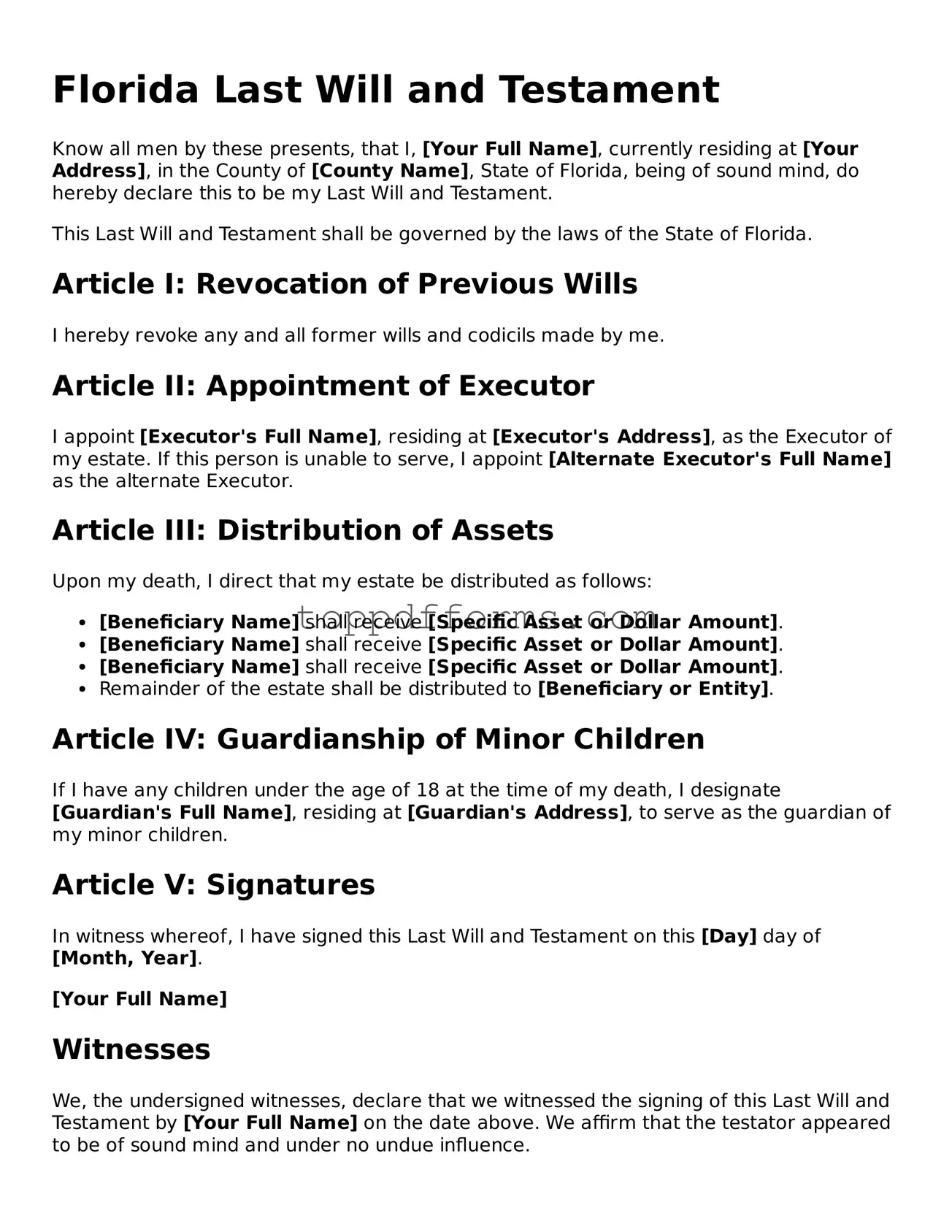Last Will and Testament Document for Florida State
Things You Should Know About This Form
What is a Florida Last Will and Testament?
A Florida Last Will and Testament is a legal document that outlines how a person's assets will be distributed after their death. It allows individuals to specify who will inherit their property, appoint guardians for minor children, and designate an executor to manage the estate. This document ensures that a person's wishes are followed and can help prevent disputes among family members.
Do I need a lawyer to create a Last Will and Testament in Florida?
While it is not legally required to have a lawyer to create a Last Will and Testament in Florida, consulting one can be beneficial. A lawyer can help ensure that the will complies with state laws and accurately reflects your wishes. If your estate is complex or if you have specific concerns, professional guidance is recommended.
What are the requirements for a valid will in Florida?
In Florida, a valid will must be in writing and signed by the testator (the person making the will). Additionally, it must be witnessed by at least two individuals who are present at the same time. These witnesses must also sign the will. It's important that the testator is of sound mind and at least 18 years old when signing the will. Failure to meet these requirements may result in the will being deemed invalid.
Can I change or revoke my will in Florida?
Yes, you can change or revoke your will at any time while you are alive. To make changes, you can create a new will that explicitly states that it revokes any previous wills. Alternatively, you can add a codicil, which is an amendment to the existing will. If you wish to revoke the will entirely, you can do so by physically destroying it or by stating your intention in writing. Always ensure that any changes are made according to Florida laws to avoid complications.
What happens if I die without a will in Florida?
If you die without a will in Florida, your estate will be distributed according to state intestacy laws. This means that your assets will be divided among your surviving relatives based on a predetermined hierarchy. This process can lead to outcomes that may not align with your wishes. To avoid this situation, it is advisable to create a will to ensure that your assets are distributed as you desire.
PDF Overview
| Fact Name | Description |
|---|---|
| Legal Requirement | In Florida, a Last Will and Testament must be in writing and signed by the testator (the person making the will) to be valid. |
| Witnesses | The will must be signed in the presence of at least two witnesses, who also need to sign the document. This ensures that the will is recognized as valid. |
| Governing Law | The Florida Statutes, specifically Chapter 732, govern the creation and execution of wills in the state. |
| Revocation | A Last Will and Testament can be revoked by the testator at any time, typically through a new will or by physically destroying the existing will. |
Common mistakes
Creating a Last Will and Testament is an important step in ensuring that your wishes are honored after your passing. However, many people make common mistakes when filling out this crucial document. Understanding these pitfalls can help individuals avoid issues that may complicate the probate process.
One frequent mistake is failing to properly identify beneficiaries. It’s essential to clearly state who will inherit your assets. Ambiguities can lead to disputes among family members. For instance, simply writing “my children” without specifying names can create confusion, especially in blended families. It’s advisable to list full names and relationships to avoid any potential misunderstandings.
Another common error involves not signing the will correctly. In Florida, the law requires that the will be signed by the testator, the person making the will, in the presence of at least two witnesses. If these requirements are not met, the will may be deemed invalid. Additionally, witnesses should not be beneficiaries themselves, as this could raise questions about their impartiality.
Some individuals overlook the importance of updating their will. Life events such as marriage, divorce, or the birth of a child can significantly change one’s estate planning needs. Failing to revise the will after such events can lead to unintended consequences, such as leaving assets to an ex-spouse or excluding a new family member.
Additionally, people often neglect to consider the implications of digital assets. In today's digital age, online accounts, cryptocurrencies, and other digital properties may hold significant value. It’s important to specify how these assets should be handled in your will. Without clear instructions, loved ones may struggle to access these accounts or may not even be aware of their existence.
Lastly, some individuals mistakenly believe that a handwritten will, also known as a holographic will, is automatically valid in Florida. While Florida does recognize holographic wills under certain circumstances, they must still meet specific legal standards. It is generally safer to use a formal template or seek legal assistance to ensure that all legal requirements are satisfied.
Other Common State-specific Last Will and Testament Forms
Will in Testament - Making a will can also address concerns about financial mismanagement by heirs.
In addition to properly completing the Trailer Bill of Sale form, you may find it useful to explore various resources that offer templates, including those provided by PDF Templates, which can simplify the process of drafting this important document.
Free Last Will and Testament Forms - Can offer specific gifts to friends or non-family members.
Last Will and Testament Template California - Facilitates a smoother probate process for your loved ones.
